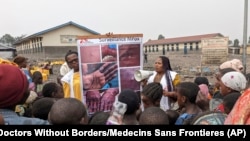By Lisa Schlein
Berlin —
The World Health Organization reports that basic public health measures can stop outbreaks of mpox and potentially eliminate transmission of the virus, which has caused 99,176 cases of the disease and 208 deaths globally since 2022.
“We know how to control mpox, and, in the European region, the steps needed to eliminate its transmission altogether,” Dr. Hans Kluge, WHO regional director for Europe, told journalists Tuesday in Geneva.
“Two years ago, we controlled mpox in Europe, thanks to the direct engagement with the most-affected communities of men who have sex with men,” he said. “We put in place robust surveillance. We thoroughly investigated new cases contacts. And we provided sound public health advice.”
Speaking on video link from Copenhagen, Kluge said the WHO was able to control the outbreak through behavior change and nondiscriminatory public health action, as well as mpox vaccination.
“Learning from our success, we urged governments and health authorities to sustain those measures — to help eliminate mpox from Europe,” he said. “But through a lack of commitment and a lack of resources, we failed to go the last mile. Today, we’re seeing about 100 new mpox clade 2 cases in the European region every month.”
Europe warned to prepare for mpox as Pakistan reports first case
The WHO declared mpox a public health emergency of international concern, or PHEIC, in July 2022 following a multicountry outbreak and rapid global spread of the disease through sexual contact. WHO declared the PHEIC over in May 2023.
However, an upsurge of mpox in the Democratic Republic of Congo and a growing number of other countries in Africa this year triggered a second mpox-related PHEIC on August 14 by WHO Director-General Tedros Adhanom Ghebreyesus.
“The emergence of a new clade of mpox, its rapid spread in eastern DRC, and the reporting of cases in several neighboring countries are very worrying,” Tedros said. “It is clear that a coordinated international response is needed to stop these outbreaks and save lives.”
Three clades of the mpox virus are recognized. Clade 1, which used to be called the Congo Basin clade, has circulated for a long time in the DRC and Central Africa. While clade 1 is primarily transmitted through sexual contact, it also has outbreaks resulting from zoonotic spillover. This strain is more severe than clade 2, which circulated globally in 2022 and is largely spread by men who have sex with men.
“In the African context, we have seen the emergence of this new clade 1b, which is transmitted between humans,” said Dr. Catherine Smallwood, WHO emergency operations program area manager.
“We have not detected zoonotic transmission in clade 1b. It seems to be a virus that is circulating exclusively in the human population, and some of the viral changes that virologists have identified show us that it likely transmits more effectively from human to human,” she said.
Last week, Sweden became the first country outside Africa to record a case of clade 1b, “and that case presented with mild symptoms,” Smallwood said.
DR Congo's humanitarian crisis helped mpox spiral into a global health emergency
The WHO reports that the emergence last year and rapid spread of the new clade 1b strain is “especially concerning and one of the main reasons for the declaration of the PHEIC.”
“The need for a coordinated response is now greatest in the African region,” Kluge said, noting that the Africa Centers for Disease Control and Prevention “declared an mpox continental emergency shortly before WHO’s global declaration.”
“Europe must choose to act in solidarity,” he said, warning that European countries needed to learn from the experience of the COVID-19 pandemic and not “stockpile vaccines for themselves.”
He said it was promising that the European Commission’s Health Emergency Preparedness and Response Authority was donating vaccines and that Belgium also seemed strongly committed to donating vaccines to Africa.
“The challenge will be if there would be a need for more and more vaccines in the WHO European region,” he said, adding, “This is the litmus test for global equity.”
WHO has recommended two vaccines for mpox use: MVA-BN and LC16. The U.N. health agency also recommends a third vaccine, ACAM2000, “when the others are not available.”
“This is a second-generation smallpox vaccination that was produced in the United States and was originally developed against the now-eradicated disease smallpox,” WHO spokesperson Tarik Jasarevic said.
The WHO reports the manufacturer of the MVA-BN vaccine, Bavarian Nordic, could produce 10 million doses of the vaccine by the end of 2025 and “could supply up to 2 million doses this year.”
It says the Japanese government had commissioned “a considerable stockpile” of the LC16 vaccine.
“Japan has been very generous in the past with donations,” Jasarevic observed, and currently was negotiating with the government of the Democratic Republic of the Congo “regarding distribution of supplies of the vaccine.”
Kluge said the rapidity with which mpox spread around the world in 2022 underscored the need for global solidarity in tackling this disease.
He cautioned, “How we respond now and in the years to come will prove a critical test for Europe and the world.”





Forum